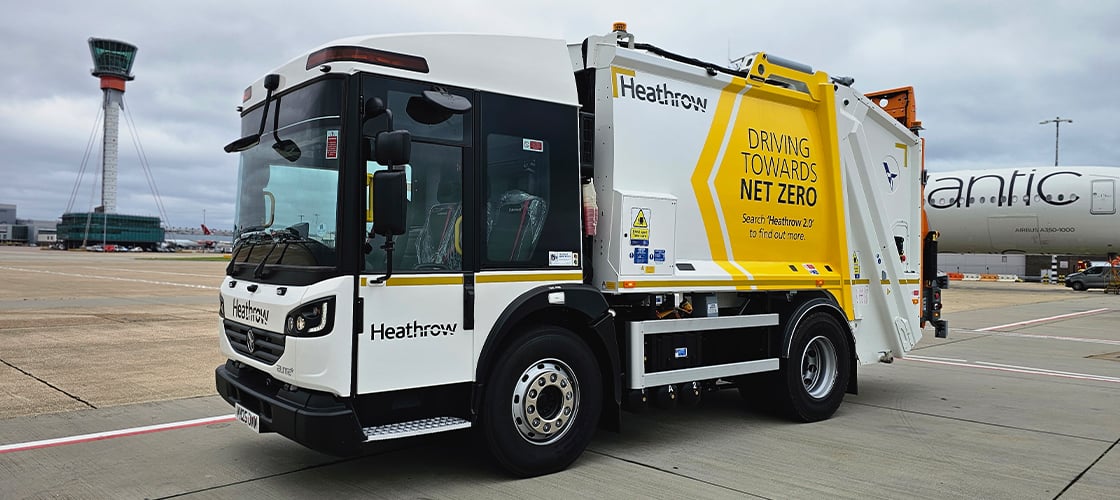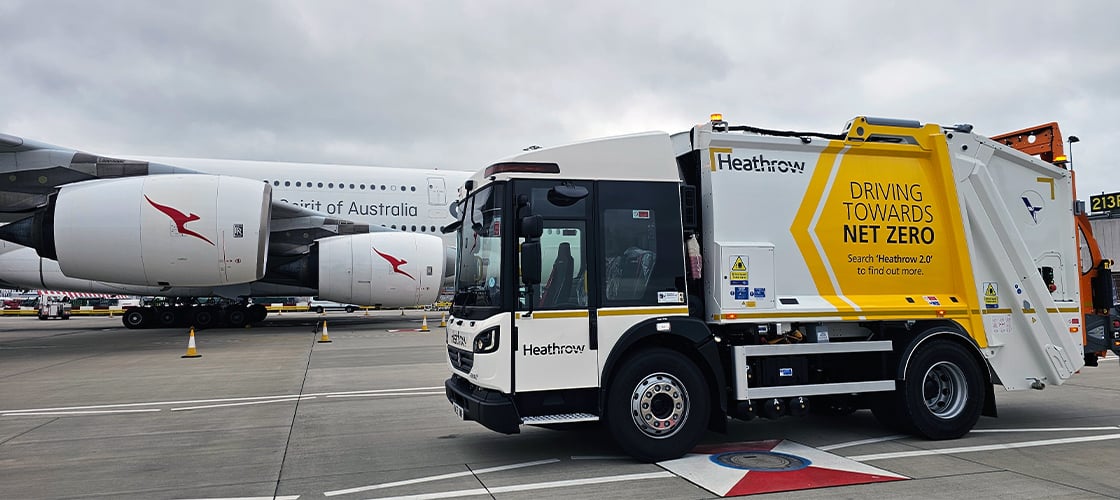Heathrow’s new RCV is off to a flying start

FOD can have a substantial impact on the health and safety of aeroplanes if not dealt with sufficiently, increasing the risk of damage to engines. As a result, each airside stand at Heathrow is given its own designated rubbish bin into which any potential FOD or other waste is deposited for collection. To ensure this waste is appropriately disposed of, one of our market-leading refuse collection vehicles (RCVs) has now been selected to take on this critical task.
A particularly challenging environment to negotiate, the 75-year-old airport is home to a varied and complex mix of moving vehicles and equipment, meaning manoeuvrability is largely restricted. Our slimline Elite+ Narrow chassis with an Olympus 10m3 body and OmniDEL electric bin lift proved the ideal size for Heathrow, offering sufficient flexibility for the airside collections as well as industry-leading visibility and enhanced safety for operators thanks to our Elite+ low-entry cab.
“Following a tour of Heathrow’s waste management operations and learning about the importance of FOD collection, we worked closely with their team to determine which of our vehicles would be the best fit for their unique requirements,” said Dan Foden, Regional Sales Manager, Dennis Eagle. “While our 18-tonne eCollect was met with some great feedback, Heathrow eventually decided to go with the Elite+ Narrow and Olympus body, with the electric bin lift of particular interest.”

Electric bin lift sparks interest
While Heathrow is committed to making the eventual switch to electric RCVs, their current electric vehicle infrastructure is unable to support the trialled 18-tonne eCollect, which is why the decision was made to employ the diesel variant instead. However, in a continual bid to reduce its environmental impact and achieve its sustainability goals, the airport selected Terberg’s market-leading OmniDEL electric bin lift to complete the RCV due to its ability to provide better, more efficient fuel economy, lower operating costs, and almost silent operation. In fact, when compared to its OmniDEL hydraulic equivalent, the electric lift has previously shown a 9.7% reduction in fuel consumption, resulting in an estimated annual saving of 3,500kg CO2e per vehicle.
The airport has also long been using hydrotreated vegetable oil (HVO) to power most of its fleet, a trend that will continue with their new Dennis Eagle RCV, helping to reduce their carbon footprint in the drive towards net zero.
“Prior to having the Dennis Eagle RCV, we were using two waste collection vehicles but realised for utilisation purposes this would be more efficient with just one,” said Stuart Roblin, Motor Transport Manager, Heathrow. “The compact size and key safety features of the new RCV will make a huge difference to our airside waste collections, not to mention the many economic benefits made possible by the electric bin lift. Working with Dennis Eagle to achieve this outcome has been a great experience. From the very start, their people have taken the time and effort to fully understand our needs and the environment the RCV would be working in to reach the right solution.”
Our experts worked closely with Heathrow to install bespoke airside beacons onto the vehicle, designing these to match their required specifications. The RCV was delivered in August 2025, complete with a new, dynamic wrap from Creative Vehicle Wrapping. “We are very satisfied with the vehicle and grateful for the comprehensive operator and technical training provided by Dennis Eagle’s team,” added Stuart. “We look forward to its many years of airside operational use.”